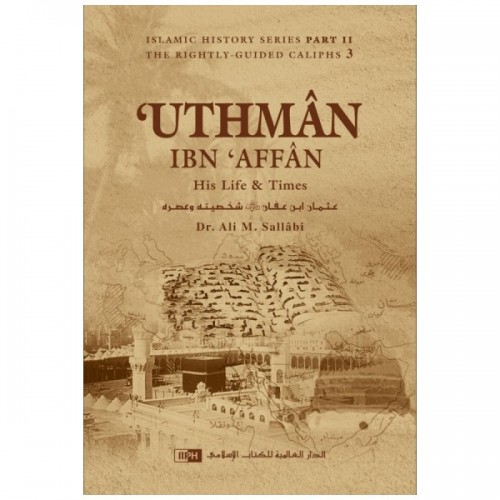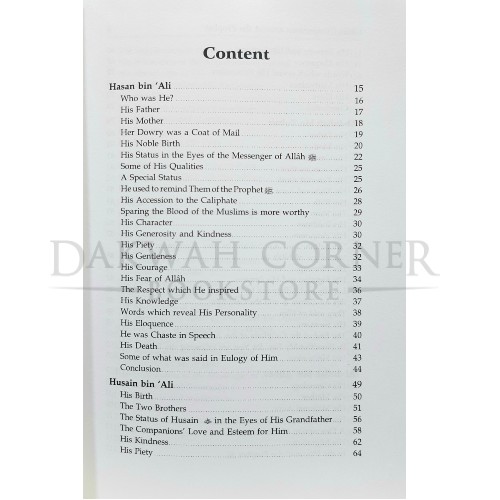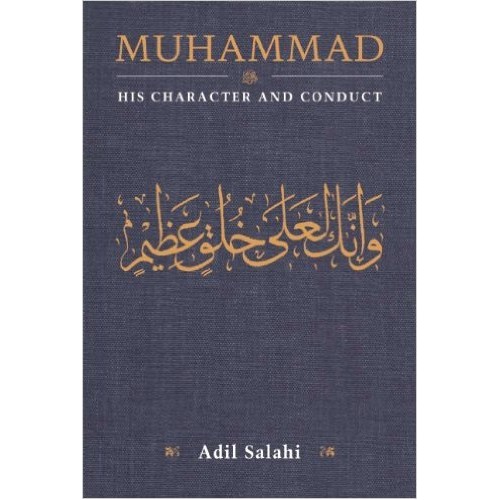The era of the four imāms was a turning point in Islāmic history. It was a time shaped by a firm commitment to the Islāmic identity and an openness to change. The Islāmic identity provided the cultural foundation and the basis for intellectual pursuits. At the same time, the era of the four imāms was a time of accelerated social change due to the number of new nations and cultures which had entered into Islām, often in their entirety. It was also a time of increased cultural interaction and cross-fertilization between the Muslim world and neighbouring nations. The codification of the four legal schools was a declaration of a new start, requiring dedication to following a tradition, a renewal of allegiance, and the affirmation of sound methodological principles.
In the Company of the Imams by Islam Today
RM30.00
This book explores the lives of the four imams who were the founders of the canonical schools of Islamic Law. It explores the areas of convergence and disagreement between these great scholars to reveal the unity of their basic principles as well as the multiplicity of their opinion and judgments. In doing so, it demonstrates Islam’s inherent flexibility, which takes into account the different historical, social and geographical circumstances in which people find themselves. This allows the teachings of Islam to remain vital for every place and time.
Frequently Bought Together
| Weight | 0.29 kg |
|---|---|
| Dimensions | 21.5 × 14 × 1 cm |
| Author | |
| ISBN | 3369856124562 |
| Pages | 212 |
| Product Type | Book |
| Binding | Softcover |
| Year of publication | 2024 |
| Edition | Reprint 2024 |
| Publisher | Islam Today |
Be the first to review “In the Company of the Imams by Islam Today” Cancel reply
You must be logged in to post a review.
Related Products
Umar Bin ‘Abd Al-‘Aziz (Darussalam)
Seerah and Biographies
Salah Ad-Deen Al Ayubi – 3 Volumes (H/B)
The renowned contemporary Arab historian of Islam, Dr. Ali M. Sallabi has written a fascinating biography of a man who looms larger than life throughout history, yet who remains largely unknown to people outside the Arab world. Dr. Sallabi’s meticulous research has effectively filled that gap in our knowledge. His work is more than just biography, as the reader will see.
Volume One of Salah ad-Deer al-Ayubi sets the stage for the advent of the Ayubids as Dr. Sallabi describes vividly (and with his characteristic candour) the geopolitical scene upon which the first Crusades were acted out and their effects on the Muslim world in the twelfth century CE. The author discusses the events and introduces the many interesting personalities that played important parts in this real-life drama.
Volume Two of Salah ad-Deen al-Ayubi discusses the establishment of the Ayubid state, mentioning the origins of Salah ad-Deen’s family, his birth and childhood; Dr. Sallabi describes the character and ethics of Salah ad-Deen: how he put an end to the Fatimid opposition and reorganised administrative affairs in Egypt; his efforts to revive the Sunnah in Egypt; his jihad against the Crusaders; his use of his literary skills in the service of Islam; and his keenness to unite the Muslim world. Theauthor discusses the events and introduces the many other interesting personalities that played important parts in this crucial period in world history.
Volume Three of Salah ad-Deen al-Ayubi discusses the influencing factors and the ramifications of three crucial events in which Salah ad-Deen played the leading role. Dr. Sallabi also describes the many other interesting personalities that played important parts in this turbulent period in world history. In the words of Dr. Sallabi, “The beauty of Islam became apparent to westerners from the conduct of Salk ad-Deen in peace and in war, his respect for freedom of opinion and belief, and his adherence to lofty, humane values and the sublime teachings of Islam.”
This three-volume work has been made more useful to the reader in this English edition through the addition of a map, a timeline, a list of the dynasties of the period, and a comprehensive Glossary.
Pages: Vol 1: 467, Vol 2: 360, Vol 3: 304
Muhammad the Ideal Prophet (P/B)
Man needs a perfect and universal exemplar who could place in his hands a guide-book of practical life, so that every wayfarer may reach his destination safely. And this exemplar did come to the world in the person of the last of the Prophets, Muhammad, on whom be peace and blessing of the Lord.
This book took shape from a series of lectures given by the author in 1925 at Madras, India. In these lectures the author vividly presents the life of the Prophet as an abiding historical model – not an utopian ideal – for all humanity. This book is a must for every student of religion.
Saiyid Sulaiman Nadwi, the author, was the illustrious student of Allama Shibli Nu’mani whose masterpiece, Sirat-Un-Nabi, he edited and presented to the world after his teacher’s death.
Muhammad The Hero as Prophet (P/B)
In this book, the author examins the primary the facts which made Muhammad (saw) the Hero as Prophet. To this day, it stands a very clear, concise, knowledgeable anfd fair account of the last prophet of God.
Umar ibn al-Khattâb: His Life and Times (2 Vols.) -IIPH
The second caliph of Islam, ‘Umar ibn al-Khattâb faced more struggles than any other Muslim leader in the early onset of Islam. His life began in a time of ignorance and ended during the Golden Age of Islam. Under his leadership, the Muslim world was witnessing some of its most notable conquests in the history of Islam. The strength and resilience of Islam’s leaders were being tested, and ‘Umar ibn al-Khattâb’s true commitment to Allah shone to reveal an Islamic spirit unlike that found in any other Muslim leader. The standards by which he lived can teach us a lot about determination, hardship, and success. The two books which compose ‘Umar ibn al-Khattâb: His Life and Times are sold together as a set. They belong in Part II of the Islamic History Series, as the second set of The Rightly Guided Caliphs. The Table of Contents for Volume 1 of ‘Umar ibn al-Khattâb: His Life and Times may be viewed via the ‘View Table of Contents’ link located above. This book was translated into English by Nasiruddin al-Khattab. From the Translator: For those who would be leaders, this book offers the model of an ideal Muslim leader, one who felt responsible before Allah for the well being of all those under his rule, including his troops, women, infants, non-Muslim subjects and even animals. ‘Umar was a ‘hands on’ leader who kept himself informed and consulted scholars and experts before every major decision. For the rest of us, this book offers a window into an exciting and important period of Islamic history, and it also reminds of an important lesson, that our strength comes not from wealth or money or status, but from our submission to Allah and our commitment to the path of Islam.
Abu Bakr As-Siddeeq His Life And Times (IIPH)
The life of the first Rightly-Guided Caliph, Abu Bakr as-Siddeeq (may Allah be pleased with him) is a valuable roadmap for the Muslims of today. One of the first people to believe and embrace the Prophet’s Message of Islam, Abu Bakr remained a close companion of the Prophet (blessings and peace be upon him) throughout the Prophet’s life. Appointed as the Prophet’s successor on the basis of consultation, Abu Bakr proved to be a great leader who, with Allah’s help, steered the Ummah through difficult times. He faced numerous challenges within Arabia: some people apostatized, others refused to pay zakâh, and quite a few individuals emerged as false prophets, attracting many followers. Outside Arabia, the Persians and Byzantines keenly observed these developments, looking for an opportunity to crush the new state. Abu Bakr employed effective strategies to deal with these challenges and had remarkable success in doing so. Thus, he paved way for the Islamic conquests that toppled tyrants and carried the message of Islam to the entire world. His leadership should be a great source of inspiration for the Muslims today.
Early Sources For Prophet Muhammad’s Biography (H/B)
In ‘Early Sources for Prophet Muhammad’s Biography’, Dr. Muhammad Saeed Mitwally aims to prove that applying Western methods of critical analysis to the available Muslim sources can take us back to early, reliable information about the Prophet (sa).
Early Western biographies of the Prophet of Islam (sa) were largely based upon the Qur’an, as well as upon the late Muslim sources dating from the sixteenth century. After the publication of Goldziher’s Muhammedanische Studien in 1890, the reliability of Muslim sources became controversial. This stance was intensified by the publication of Schacht’s The Origins of Muhammadan Jurisprudence, in which he claimed that none of the Hadith literature is authentic. In this book, Dr. Muhammad Saeed Mitwally successfully challenges some of the problems raised by the pessimistic attitude.
Students of Hadith will find this study thought-provoking and informative.
Uthman Ibn Affan His Life and Times (IIPH)
By Dr. Ali Muhammad As-Sallabi
In today’s crisis-ridden world, amidst the numerous internal and external forces striking at the roots of Islam, Muslims are truly hard pressed to find strong and competent leaders. This has not always been the case, though. Examples of first-rate leaders are plentiful in Islamic history.
The life and times of Uthmân ibn Affân, as detailed in this book by Dr. Ali M. Sallâbi, truly illustrate the characteristics of exemplary leaders along with the commendable qualities of those under them. This account of how Uthmân ibn Affân, the third Rightly-Guided Caliph, expanded the Islamic state, compiled the Qur’an into a single edition, and, finally, dealt with the turmoil that engulfed the Ummah, makes for a very enlightening read. The author has also given us insight into the life of Dhun-Noorayn (Uthmân, the ‘Possessor of the Two Lights’) before he became the caliph. Readers discover his attachment to the Prophet (sa), his relationship with the Qur’an and his generous financial contributions towards the founding of the Islamic state. All in all, this book will prove to be a valuable resource on Islamic history.
Child Companions around the Prophet pbuh (H/B)
Description from the publisher:
These 178 companions are those who accepted Islam in their childhood and spent it being around Prophet صلی الله علیه وآله وسلّم and getting benefits from his teachings and learning from his manners. The Prophet used to love the children and his behaviour with them is model to follow. He taught them the manners of eating, talking to theirs elders, behaving with other children, along with guiding them to the basic points of Islamic teachings.
It includes the biography of the following companions:
Hasan bin ‘Ali رضی الله عنه
Husain bin ‘Ali رضی الله عنه
Abdullah bin Zoubir رضی الله عنه
Abdullah bin ‘Abbas رضی الله عنه
Abdullah bin Ja’far رضی الله عنه
Abdullah bin ‘Umar رضی الله عنه
Abdullah bin ‘Amr رضی الله عنه
Usamah bin Zaid رضی الله عنه
Anas bin Malik رضی الله عنه
Sa’eed bin Al-‘Aasرضی الله عنه
Muhammad His Character and Conduct
Seerah and Biographies
Recently Viewed
The Farewell Advice of The Prophet
In recent times, many sincere Muslims have looked to ascertain the situation of our Nation, and what they saw were the effects of the Devil (Shaytan), the blackness of wicked deeds, and the blood of many wounds. They saw discord, disagreement, disunity, confusion, and anxiety. They perceived the evil results of not ruling according to Allah’s Book – in the home, the streets, or the marketplace. They saw these results in schools, universities, books, newspapers, and the media; in fact, they even witnessed them in the best of places, mosques, where innovations now flourish. And they have also seen the effects of that evil among the ranks of callers to Islam and students of knowledge.
Those who hasten to do good deeds are in competition to find a cure for our Nation and its woes. The medicines, rather the panaceas, that are proffered are many, yet the situation remains as it is – except in certain quarters, where scattered efforts are made, but not enough to effect an overall change.
If we truly want a universal cure to our woes, we must study the advice and farewell guidance given by the Prophet (pbuh) to his Companions and to his Nation…









































There are no reviews yet.